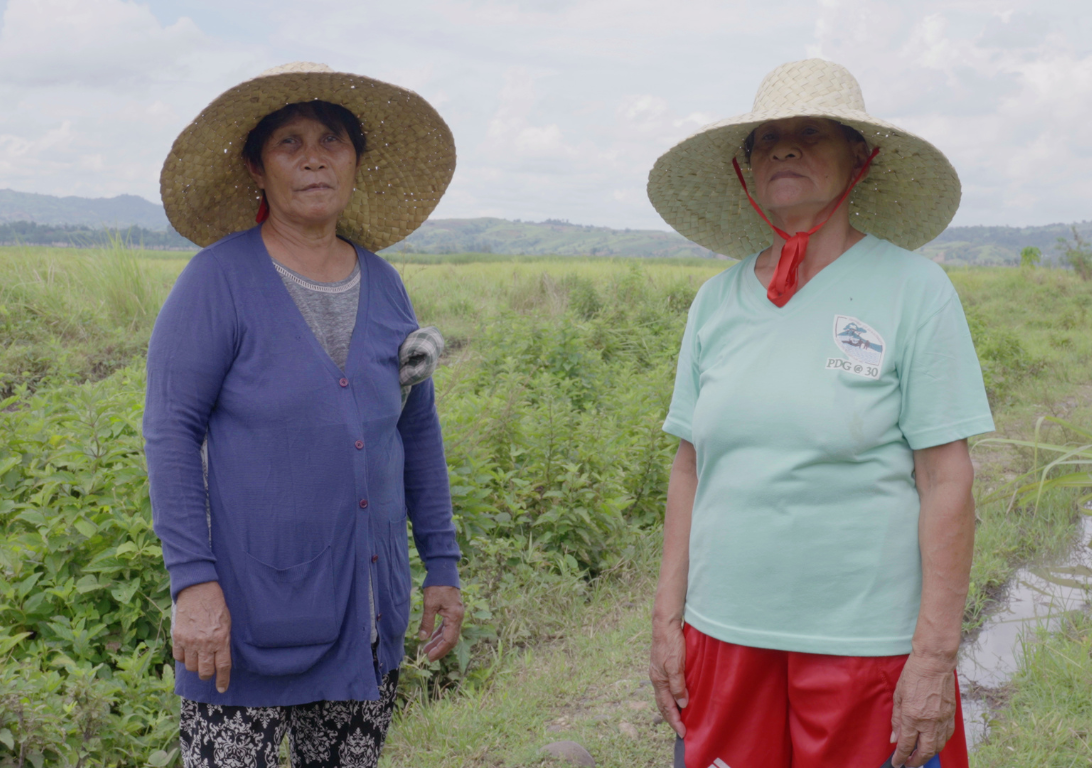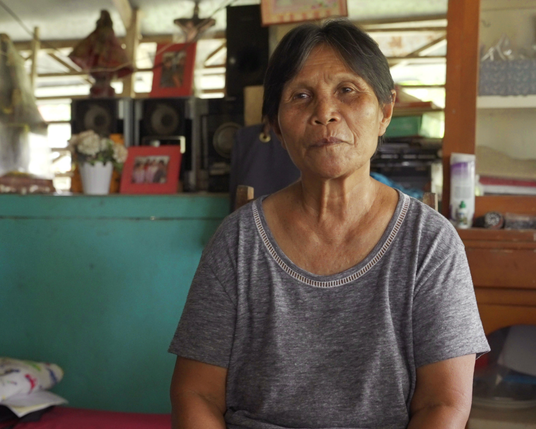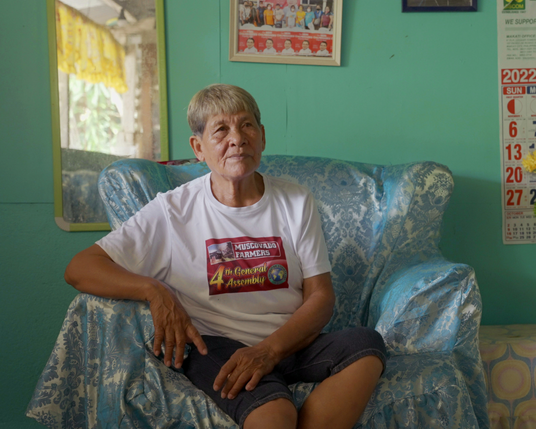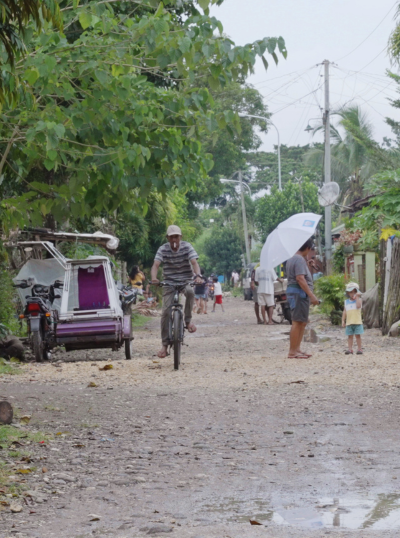Reclaiming the Land
Testimonies from a Community in Struggle in the Philippine Countryside

ARGENE
In the mid-90s, the Department of Agrarian Reform started a program: Taskforce Sugarland. PDG came around that time and their staff, including Attorney Ben, had talks here. They hosted a meeting for farmworkers in the hacienda to explain the program. That’s when we decided to join, in order to claim some land. The managers found out that there was a group of us who were going to join the program, so we were called into the office of the hacienda owner, Mrs. Stark, and we were told to withdraw our registrations with DAR because she would give us favors, benefits, and our children would be put through school for free at her expense. But we persisted.


Some of us leaders even went to Manila to campaign and hold a rally at Landbank in Makati, so that they would put out the land valuation that was needed for our land case. We had joint mass actions targeting the Department of Labor and DAR. While we were in Manila rallying, there was an NGO connected with PDG who looked after us and helped us with our daily needs. Attorney Ben Ramos was there as well. And there were so many people’s organizations that went to support us, from Calabarzon and Calamba, Luzon. There were also many people’s organizations from Negros supporting us, from La Castellana, from Kabankalan. Because of all the pressure, Landbank finally released the land valuation within two days.
What we’re doing now is standing strong to defend our rights and our livelihood. Because of this, the military keeps on slandering us. Just recently, there was a fellow in another area, he was separated from his companions and brought in for questioning. They showed him pictures and asked, “Do you know this person? Or this person? How about this person?” Of course he knew those of us in the pictures. All of the people’s organizations around here, we hold collective gatherings with representatives from each organization. We know that our problems are connected and that we need to help each other. They showed him photographs of us leaders, folks from different areas, as well as staff of PDG. All of our actions are being monitored. Every movement, down to the month, day, and hour, it’s there in the hands of the military. So now we have to be vigilant. We’re in a situation now where it’s like we’re criminals, yet we haven’t committed any crimes. Still, we continue to struggle. Before we thought that once we had won the land, we would be able to live our lives in peace. But now, we’re being chased by the military, it’s like our lives are on the line. There were three of us women leaders here before, they called us the Tres Malditas. But now one of us is resting because of her health, so it’s just me and Nancy who continue on.
My greatest dream is that those who don’t have land will one day have access to land and that genuine agrarian reform will be implemented. And that people will not be displaced from the land they already live on. Not just here but in the whole of the Philippines. Also of course, I dream that there will be no military chasing after us, so that we can live peacefully on our own land, without displacement. But now, we have these problems, like a private company, Procton Developer, who is trying to take this land to develop it, which is making this dream harder to reach. But we continue on, together as a group. We continue to struggle.

Nancy
We found out about the Taskforce Sugarland program, where they would redistribute swaths of sugar land as part of the Comprehensive Agrarian Reform Program. At that time, Mrs. Stark was still a congresswoman. PDG came and they were the ones who informed us that we had an opportunity to claim land through the program. They were giving us lessons to understand the process. When Mrs. Stark found out about it, she threatened to take away our work. But we didn’t stop. We kept going with PDG, because they made us understand that, even if we are just workers, we have the chance to be owners of some land. On our part, we saw that the situation here of working on the hacienda was not really livable, the wage was so small, we couldn’t even support the children finishing school. So we continued with PDG, even when Mrs. Stark was threatening us. It reached a point when our work was actually taken away. That was when the manager told us, “I’m sorry but starting now, you can’t work.” He showed us the memorandum from Mrs. Stark and I asked to borrow it to show my companions. It was written in English, but from what I understood, it said, “For all laborers in Hacienda Bino who are joining the program of CARP, I will cease your work.” Without her knowing it, we had the memorandum photocopied and processed a case. We raised a case of illegal dismissal with the Department of Labor.
The period after that was really difficult. We would try to find work elsewhere but when she would hear that we were working at another hacienda, she would have her manager go there and tell them, “Don’t let these people work here or else they’ll try to take your land.” So we would always be let go. Some men found work by the river, in quarries, anything to make money to buy food. But even if it was difficult, it was okay for us; it’s the choice we made in order to try to claim land. PDG continued teaching us: skills training, capability building, and so on. We have deep gratitude for PDG because they understood our rights as workers and taught us that we also have the right to own and look after land. But we really went through huge difficulties.
We were finally awarded the land in 1998. And we could see the difference. When we were working for Mrs. Stark, we would have to wake up early and work from 6 a.m. until 10 a.m., and then again from around noon or 1 p.m. up to 4 p.m., every day. But after the land was given to us in 1998, it was us cultivating the land ourselves. We could manage our days, our hours, our time. We didn’t have a master managing us. But there were still challenges because we didn’t have capital, we didn’t have money to spend for cultivating, so we would have to ask for community support. Also, there were so many legal cases raised against us from Mrs. Stark. Good thing that our lawyer was free. It was Attorney Ben who was helping us. And he didn’t help just us, there were other farmers in Kabankalan, others in Hinobaan, who he was helping as well. He was committed to helping the poor.


They thought that if they cut the tree, the fruits would die out—that’s where they were wrong. Even when they killed Attorney Ben, we didn’t give up. We didn’t rest, we continued the cause that he started. That’s what we’re doing now. Although Attorney Ben is no longer here, we will not stop. We continue to struggle, however we can, we defend ourselves and our rights. We won’t stop while we still have the strength to go on. That is the perspective of our group: Even though they killed Attorney Ben, they will not win. Why? Because we will continue what Attorney Ben started, and we will not waver.

About the Artist

Enzo Camacho & Ami Lien
Enzo Camacho and Ami Lien are artists and writers from the Philippines and the US, respectively. Together, they have an artistic practice that moves from the Philippines outward to other places, addressing localized iterations of labor and capital from the perspective of imperial damage. They have had solo exhibitions at Kunstverein Freiburg (2018); and Hessel Museum of Art, Bard College, Annandale-on-Hudson (2018). Their work has been included in recent group exhibitions at Tai Kwun Contemporary, Hong Kong (2022); the 10th Asia Pacific Triennial, Queensland Art Gallery, Brisbane (2021); the 5th New Museum Triennial, New York (2021); the 39th EVA International, Limerick (2021); Manifesta 13, Marseille (2020); the Drawing Center, New York (2020); the Kuandu Museum of Fine Arts, Taipei (2019); the Brunei Gallery, SOAS University of London (2019); the NTU Center for Contemporary Art, Singapore (2018); UCCA Center for Contemporary Art, Beijing (2017); Jim Thompson Art Center, Bangkok (2017); and Green Papaya Art Projects, Manila (2009). From 2021 to 2023, Camacho and Lien were fellows at the Graduate School of the Universität der Kunste, Berlin.
